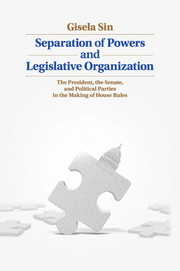Separation of Powers and Legislative Organization The President, the Senate, and Political Parties in the Making of House Rules
Auteur : Sin Gisela

Date de parution : 12-2017
Ouvrage de 211 p.
15.3x23 cm
Disponible chez l'éditeur (délai d'approvisionnement : 14 jours).
Prix indicatif 31,58 €
Ajouter au panierDate de parution : 12-2014
Ouvrage de 212 p.
15.2x23.1 cm
Disponible chez l'éditeur (délai d'approvisionnement : 14 jours).
Prix indicatif 86,50 €
Ajouter au panier


